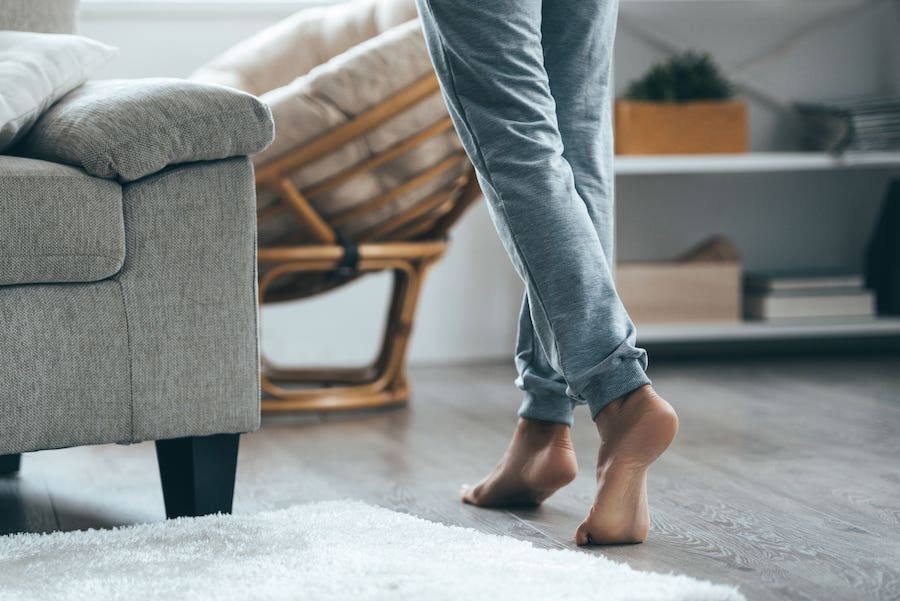Neglecting your feet? Expert tips for keeping feet healthy and pain-free
Our feet can take us through thousands of steps per day, yet all too often, we can neglect their health in a way we wouldn’t with other parts of our body.
Whether it’s cramming them into uncomfortable shoes, putting them through gruelling workouts or simply forgetting to give them the TLC they need, our toes, heels and arches can become cracked, sore and painful.
“Your feet regularly bare the weight of your entire body and undergo enormous stress as you go about your daily life – all without complaint and requiring very little attention,” says Mr Kaser Nazir, consultant podiatric surgeon at the Cadogan Clinic (cadoganclinic.com).

Feet bear the brunt of our daily movement
“Yet the foot is in many ways a fragile part of the body, and without healthy feet, many of our day-to-day activities can become difficult and sometimes unbearable,” Nazir adds.
As with all aspects of health, prevention is better than cure – and looking after your feet now can help you avoid problems later on. Here, experts share some vital tips and advice for keeping your feet sweet for years to come…
Why is it important to look after your feet?
“Your feet are your body’s foundation. When they are strong, in good health and happy, you can get on with your day-to-day activities with ease and comfort,” says DG Podiatrist’s Dina Gohil (dgpodiatrist.com), who is also an ambassador for CCS Foot Care (ccsfootcare.co.uk).
Each of our feet contains 26 bones, 33 joints, thousands of nerve endings and more than 100 muscles, ligaments and tendons – all working together so we can stand, balance, walk and move.

The human foot is a complex mechanical structure
“The feet are highly complex structures and work in many ways to do even the simplest of things, like taking you to your first cup of coffee in the morning,” says Gohil. “Which is why it’s important to not think of your feet as separate identities, but more as an extension of your body.”
Gohil explains that our feet movements impact the ankles, knees, hips, back and spinal cord and neck. “When your feet are in good health, we often forget about them, but when they’re in pain it can become a real problem for your day-to-day mobility,” she adds.
Dr Ravi Tomar, GP at Portland Medical (portlandmedicalcentre.co.uk), says foot problems can lead to us getting a lack of physical exercise too, which can increase your risk of bigger health issues, such as type 2 diabetes and heart disease, reduced conditioning and loss of muscle mass.
What kind of foot problems are most common?
Dr Tomar says it’s extremely common to develop a foot condition, as the average pair of feet will walk around 110,000 miles or 220,000,000 steps over the course of a lifetime.
Athlete’s foot is a fungal infection of the skin that effects around 15-25% of the general population. “Often it begins with telltale tiny blisters, which burst and dry up, causing the skin to flake, crack, itch and burn,” says Tomar.
“Keeping your feet clean and dry and wearing cotton socks can help to absorb moisture and discourage fungal growth,” he adds. “You can also use an anti-fungal powder, solution or cream to help with the problem, but if sores don’t heal after one week, you should seek further medical care.”

Athlete’s foot: look out for itchy, sore patches between your toes
Bunions – swollen and tender areas caused by misaligned joints – are another common foot gripe. “They’re often as a result of poorly fitting footwear,” says Tomar, who adds that it’s usually the big toe that’s affected and develops an overgrowth of bone.
Special cushions worn in the shoe can alleviate some of the pressure caused by bunions, and wearing un-heeled, wide shoes that allow the foot to naturally spread when walking can help prevent them from happening in the first place. “If symptoms persist though, your GP might suggest steroid injections, which may help alleviate swelling,” says Tomar. Some people may also need bunion surgery.
Corns and calluses are areas of hard, thickened skin which can cause pain and burning sensations. “Corns form on the top of toes above a centre joint, or on the soles of your feet,” says Tomar, while calluses form on the heel or ball of your foot.
“Wearing properly fitting shoes can reduce the friction and pressure on the feet, which causes corns and calluses,” he stresses. “Pharmacies can also provide you with corn caps, to remove the top layer of hard skin.”
Another common foot issue, ingrown toenails are one of the most unsightly foot problems to deal with – and they can be agony to walk on too. “When a toenail becomes ingrown, the corners of the nail cut into your skin and cause pain – especially when pressure is applied to the toe.”
In the first instance, Tomar recommends soaking your toe in warm water for relief, but it’s important to get early medical treatment, to treat the ingrown toenail and prevent infection. If the problem persists, surgery may be required.
6 key tips for looking after your feet
Podiatric surgeon Kaser Nazir suggests six simple tips for keeping your feet happy and healthy:
1. Regularly wash your feet: “When showering or bathing, be sure to use warm water and dry them thoroughly afterwards. Keeping your feet clean will help prevent infections like athlete’s foot, or fungal growth around the toenails.”
2. Carefully cut your toenails: “Keeping your toenails trimmed will help reduce the chance of an ingrown toenail or nail impingement in shoes. Be sure to cut across the nail, and not around or down the edges.”
3. Wear sensible shoes: “Poorly fitted shoes can create painful issues, like heel pain, or aggravate deformities like hammertoes, claw toes or bunions. It’s a good idea to make sure there’s plenty of room in the toe boxes of your shoes, as high-pressure shoes, such as high heels, can be particularly aggravating for painful symptoms.”
4. Moisturise and file: “Using skin lotion and filing corns and calluses will help keep the skin smooth and pain-free.”
5. Change your socks daily: “If you’re not already in the basic habit, this can reduce the chance of infection and will improve foot odour.”
6. Check your feet: “It’s worth regularly looking over your feet, especially if you are diabetic or ageing, to look for signs of injury or changes to their appearance.”
Finally, if you are ever unsure of how to look after your feet – or need assistance on how to solve a foot problem – Nazir says it’s advisable to see your doctor or arrange an appointment with a podiatrist, who can advise on the best course of treatment for you.
The Press Association
Latest posts by The Press Association (see all)
- BBC to air two-part Call The Midwife Christmas special - December 23, 2024
- 6 mind sports to exercise your brain and keep you sharp - December 20, 2024
- Quiz: What classic Christmas food or drink are you? - December 20, 2024
- Leftover turkey and watercress pie - December 20, 2024
- Catherine and William choose family shot for Christmas card photograph - December 19, 2024




















